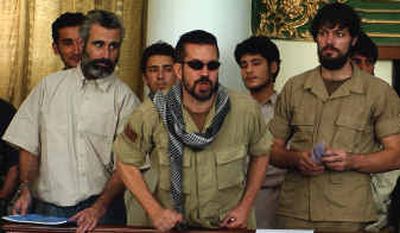Americans convicted of torturing Afghans

KABUL, Afghanistan – Three Americans accused of running a private jail and torturing Afghans were sentenced to up to 10 years in an Afghan prison Wednesday, despite defense lawyers’ claims that the trial was unfair.
Group leader Jonathan Keith “Jack” Idema, 48, wearing his trademark dark sunglasses and khaki uniform, barely flinched when he was sentenced to 10 years in prison. Brent Bennett, 28, received the same sentence. Edward Caraballo, 42, who has said he was making a documentary on the hunt for al Qaeda, was sentenced to 8 years.
After being sentenced, Idema, a former U.S. Special Forces soldier once convicted of fraud, swore several times, suggested that he might kill a couple of people before any appeal, and mentioned a “bloodbath.”
“The same sick Taliban judges, the same sick sense of justice,” Idema said.
The three Americans, who arrived in Afghanistan in mid-April, were accused of setting up a prison in a house in Kabul under the guise of an import-export business. Idema has insisted that he worked under the direction of the U.S. government and said he had been talking to officials below Defense Secretary Donald Rumsfeld. He has maintained that he was hunting for al Qaeda and the Taliban.
The men were arrested July 5 after Afghan authorities raided the house and found eight Afghan prisoners, some hanging by their feet. The prisoners said they were tortured and forced to confess to crimes they had not committed.
The U.S. government has denied any connection to the men. U.S. troops, who held one man turned over by Idema for two months, have distanced themselves from Idema and described him as a fraud. The U.S. Embassy did not answer defense lawyers’ requests to intervene in the trial, saying that the Americans should be tried under the Afghan system.
The case has proven embarrassing not just for the United States. Several Afghan officials were videotaped while meeting with Idema, who many people assumed was a member of the U.S. Special Forces because he acted and dressed like one. International peacekeeping forces even helped Idema carry out three raids on houses where he captured Afghans.
American defense lawyers said they planned to appeal. They also said they planned to get out of Afghanistan as soon as possible because they feared for their lives.
“I think it’s unlikely I’ll ever come back here,” said Robert Fogelnest, the lawyer for Caraballo.
The trial was unlike any in the United States. There was only one good microphone, moved from the lawyers to the head judge, depending on who was talking. Idema lit cigarettes and gave impromptu news conferences whenever he could. He demanded to be cross-examined but was ignored.
On Wednesday, the sixth day of the trial, Idema occasionally took control of the courtroom. He interrupted to complain about the quality of the translation. He narrated videos shot by Caraballo for his alleged documentary.
Idema’s world was one of spies and intrigue, of good guys and bad ones. He talked about his missions, of his efforts to deliver a “package,” which was “tradecraft” for a “high-value target.” His passport was issued by a “special agency in Washington,” which he could not name. One video featured a blacked-out person whose face could not be shown for “national security reasons.”
On Wednesday, the defense team mainly played videotapes as evidence. One showed the three Americans being welcomed to Afghanistan by airport officials and filling out entry forms – proof, lawyers said, that the men did not enter the country illegally. Other videos showed telephone conversations. Although Idema talked about capturing al Qaeda members, it was often impossible to know who was on the other end of the conversation.
Defense lawyers failed to get the court to even listen to their main tactic, a demand that the trial be dismissed because it did not meet international standards. The argument was ignored.
Judge Abdul Baset Bakhtiari, who led the three-judge panel, seemed to have little interest in the defense team’s case, telling the lawyers that they could not read their full statement. He became exasperated at times, asking to be shown documents that no one had.
“We don’t have time to hear about this,” Bakhtiari told the defense team. “If you have any argument about the accused people, come to that.”
The defense team argued that the accused men were linked to the U.S. government. Lawyers showed two videos of phone conversations between Idema and two men who allegedly worked for Gen. William Boykin, the deputy undersecretary for defense.
But the court did not allow defense lawyers to submit copies of faxes and letters, allegedly from Idema to Rumsfeld, Boykin, the CIA and the FBI.
The only sign of recent communication in the other direction was a copy of a FedEx package from the FBI to Idema on Jan. 14, but it is not clear what the package contained.